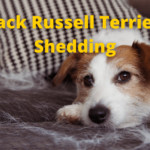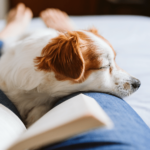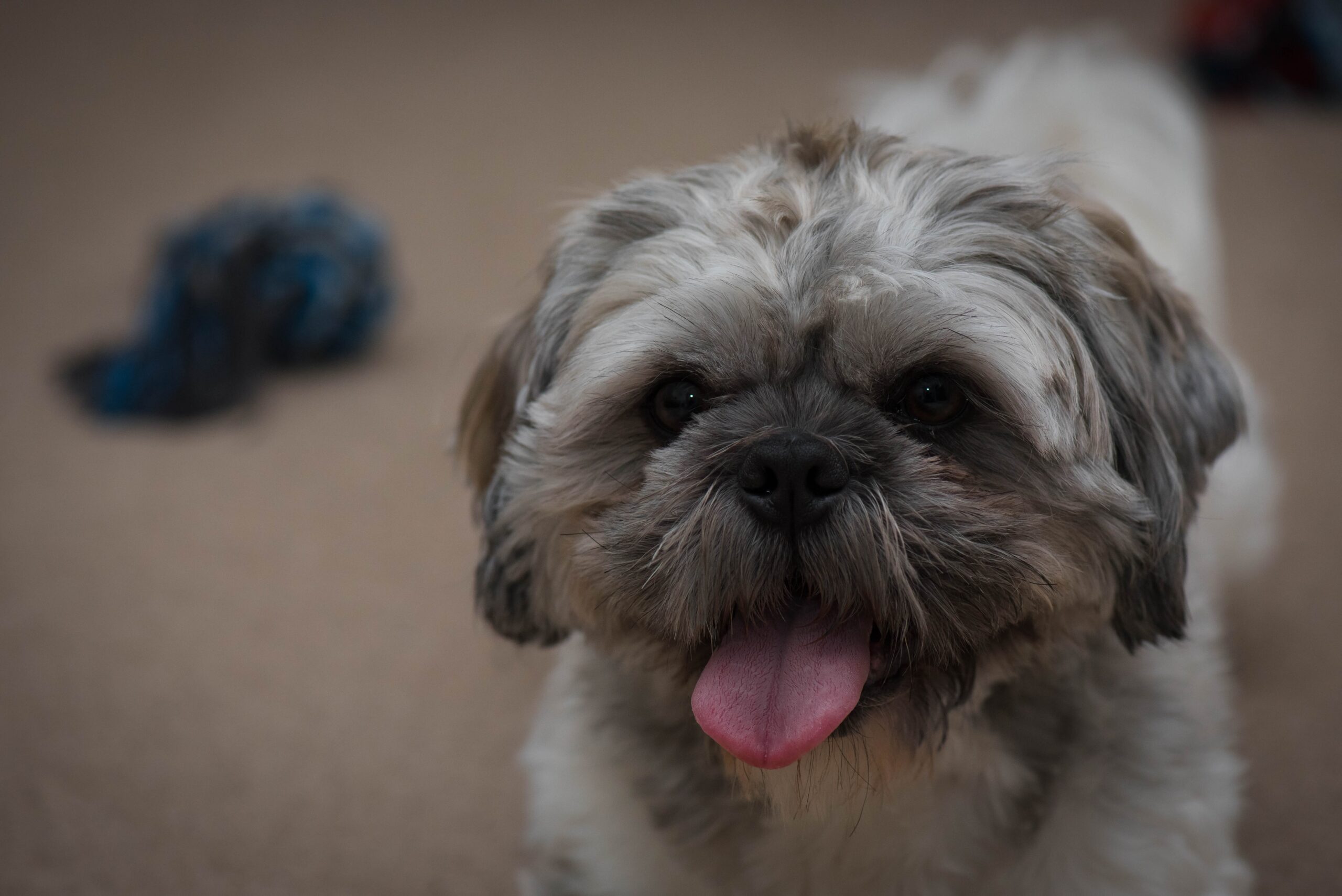
Are you concerned about “why is your dog panting at night?” Notably, in a hot and exciting situation, dog panting is expected.
Unlike humans, dogs lack sweating pores, so they maintain their body inversion through their paws & panting. In the panting strategy, their body condition becomes stable due to the release of hot air. And, such a situation is normal.
Now, you have to differentiate between normal and abnormal dog panting: panting at night. So, if you observe a dog’s excessive panting when they’re inactive, at night time, it may lead him to serious medical issues.
At this point, you need to act like a detective. There can be several causes that will make your dog uncomfortable. Every problem should be treated on time before it becomes deadly.
So let’s dive in and find out the causes or medical conditions behind dog panting at night and their solutions.
Contents
Top Alarming Causes of Dog Panting at Night
Various causes can make dogs pant at night. Some need prompt action. You can read some of the most common reasons below and help your pooch on time.
1. Heatstroke
Panting is very beneficial for dogs. Dogs cannot balance their body temperature by sweating because they lack sweat glands. Therefore, they manage their body heat by breathing heavily and panting.
Panting causes evaporation, which leads to settling down the temperature by cooling. But if your dog pants continuously at night while doing nothing, it may be because of heatstroke.
Heatstroke happens when your dog cannot undergo thermoregulation and exceeds the heat load. The following reasons might cause heatstroke in your dog.
- Heavy exercises or running a few hours before bed without taking a break can cause your dog to pant at night.
- In hot weather, dogs can easily become overheated.
- Dehydration can make your dog pant.
Heatstroke might prove fatal for your dog. Here are a few other symptoms which tell you that your dog is facing heat stroke.
- Restlessness
- Laying flat.
- Panting excessively
- Probably collapse
- Breaths sound louder & harsh.
If you see these symptoms in your dogs, you should immediately contact a vet for treatment. You can prevent your dog from fatal heatstroke by providing him cool water. Place your dog in an air-conditioned room to balance the body heat.
2. Injury or Pain
If you have a pet, understand their feelings, for they cannot tell you about their discomforts. You should know when your pup is happy, upset, feeling any pain, or having sleepless nights.
An injury or pain can also cause panting to your dog. Particularly, thoracic trauma can cause heavy panting in your dog. The following cues let you know whether your dog faces an injury or has pain.
- Enlarged pupils.
- Panting excessively
- Reduced Appetite.
- Reluctance to lie down.
- Restlessness
- Anxiety
- Biting at the pain sight
When you notice a few of these symptoms in your dog, contact a veterinarian to treat your dog’s injury & pain.
3. Stress and Separation Anxiety
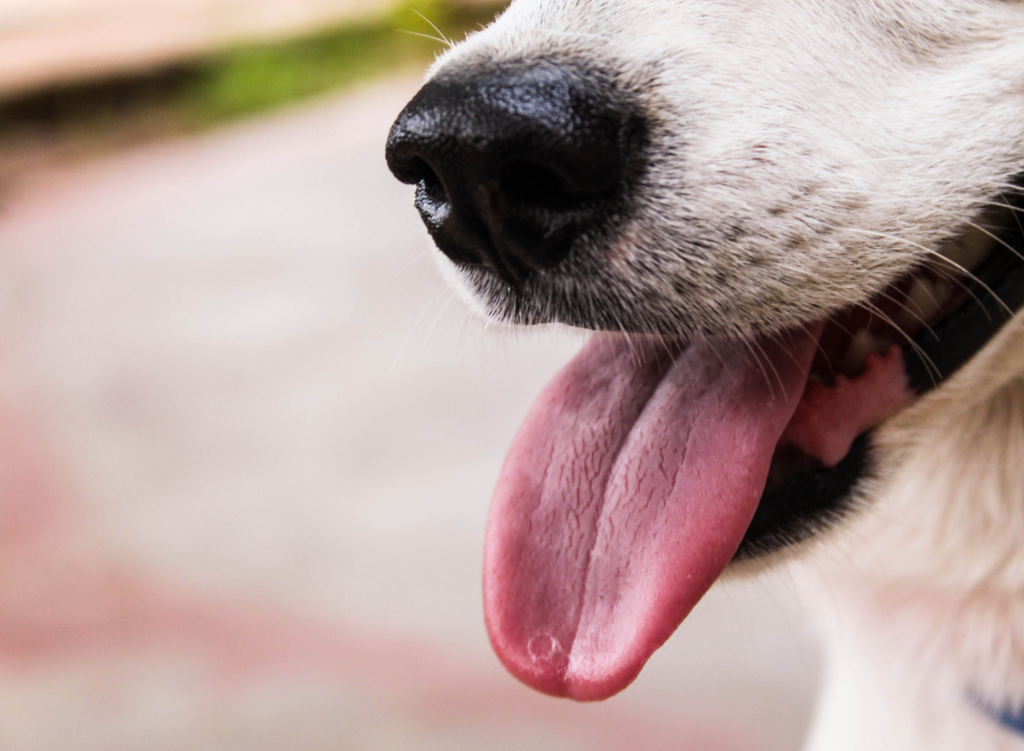
Anxiety or stress is one of the key factors which can cause unusual panting in dogs either day or night. It might be separation anxiety, a new environment, or an unhappy home environment to be stressful for your pup.
Especially when you have adopted a new dog, you may see the dog panting at night or while doing nothing.
To overcome separation anxiety, make your dog feel comfortable around you. The following symptoms can tell you that your dog is going through anxiety.
- Fearfulness
- Noise sensitivity
- Behavioral changes
- Become more aggressive
It’ll be helpful if you spend more time with your dog. You can also make arrangements to ensure comfortable sleep for your dog by getting them a comfortable bed and dog-friendly music and smell.
4. Noise Anxiety
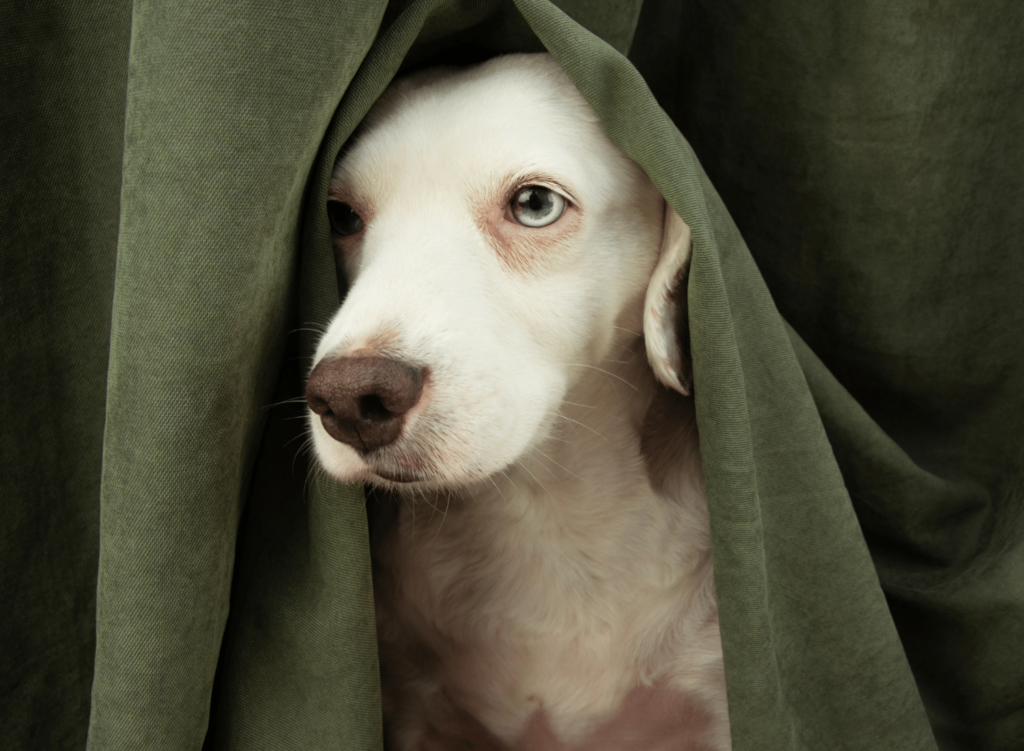
Noise anxiety might not show some sudden signs in dogs. Yet, the dog can be more sensitive to noises or sounds at night. And panting is one of the common symptoms of noise anxiety in dogs.
Simple wheezing or beep from electronics can cause nose anxiety in your dog to pant them at night. Dog’s are also good at sensing thunderstorms ahead. So, they can pant excessively if they fear such weather conditions.
Likewise, the thunderstorm, fireworks neighborhood music noises can also make your dog pant more.
If you think that your dog’s excessive panting is out of noise anxiety, you should try to make the environment more noiseless.
5. Fear of Darkness can Trigger Panting in Dogs
The abnormal panting: at the wrong time might have nothing to do with your dog’s body temperature or environmental temperature. Instead, it can be because your dog is afraid of darkness.
“No, dogs can’t be afraid of darkness,” do you think so?
You might be right because dogs have better eyesight than humans to let them be comfortable in darkness.
However, when your dog’s eyesight becomes poor, they might struggle to look in the dark. Resultantly, they feel anxious enough to pant at night. To figure out this, you need to visit a veteran.
6. Anemia
If you feel your dog is going through unusual panting, he might suffer from anemia. The low red blood cells cause restlessness in your dog by lowering the oxygen supply to cells.
Anemia is caused by IMHA (Immune-mediated hemolytic anemia) in dogs. IMHA leads to severe panting in your dog.
In anemia, your dog lacks red blood cells, which leads to low oxygen levels in different body organs. The following symptoms show your dog is suffering from anemia.
- Look tired.
- Have pale gums
- May lose appetite
- Increased thirst
- Nausea.
- Panting
Anemia may become fatal sometimes. It might cause internal bleeding in the abdomen, diseases of bone marrow, etc. When you see these symptoms in your dog, consult your veterinarian.
7. Chronic Illnesses in Old Dogs
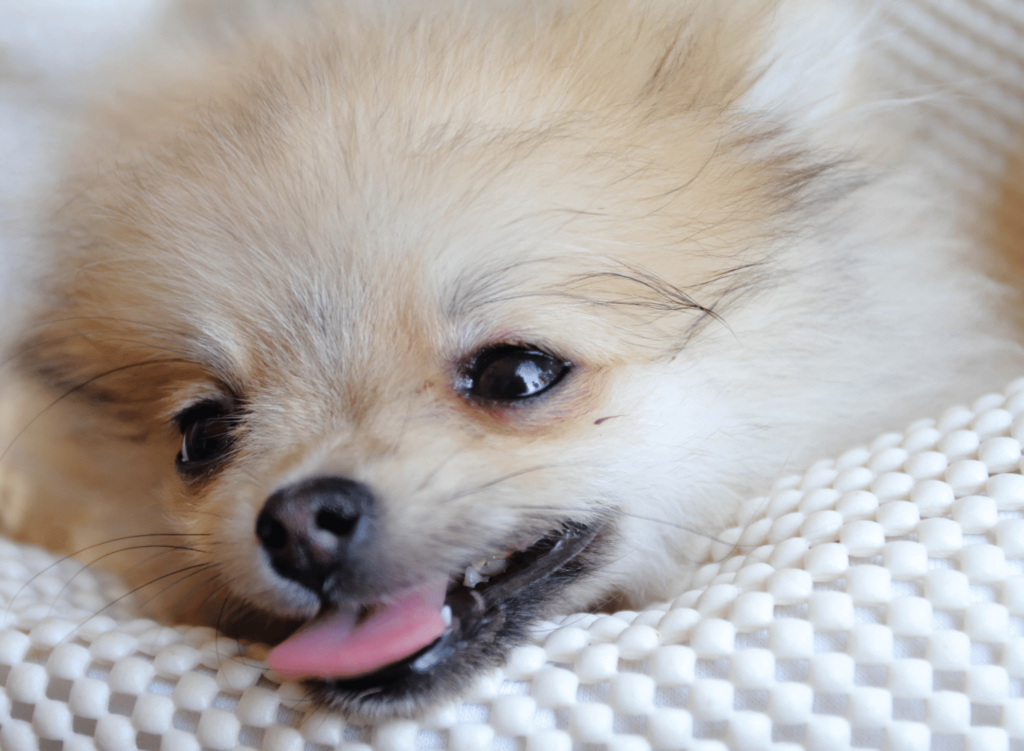
Many chronic diseases like heart failure, Cushing’s syndrome, and respiratory disorders make your dog pant heavily at night. Such issues can be common as the dog ages, primarily. These illnesses are explained as:
Heart Failure
Like other living organisms, animals can also face chronic illnesses like heart disorders. Your dog might have felt severe pains, but he cannot tell you about his health.
Like congenital heart failure, such illnesses can cause massive panting in your dogs. Therefore, you have to be active while having a pet.
Here are a few symptoms that help you know whether or not your panting dog is facing the chronic disease.
- Breathing difficulty.
- Coughing.
- Unusual panting
- Lethargy
- Weakness
If your dog is going through heart disease, you may have seen him coughing and panting unusually. It would be best to take your dog to the veterinarian for treatment. Its treatment may include ACE inhibitors and diuretics.
Respiratory Disorders
If you see your dog has restlessness and panting, he might be suffering from different respiratory diseases. These respiratory disorders include:
- Tracheal collapse
- Laryngeal paralysis
- Pneumonia
- Infections & probably cancer.
Diseases like laryngeal paralysis can be fatal to your dog. These may affect your upper respiratory tract.
Here are a few symptoms which let you know your dog is suffering from any respiratory disorder.
- Panting.
- Roaring sound while breathing
- Changes in normal body temperature
When you see your dog having these symptoms, don’t wait for a moment; contact the veterinarian for better treatment.
Cushing’s Syndrome
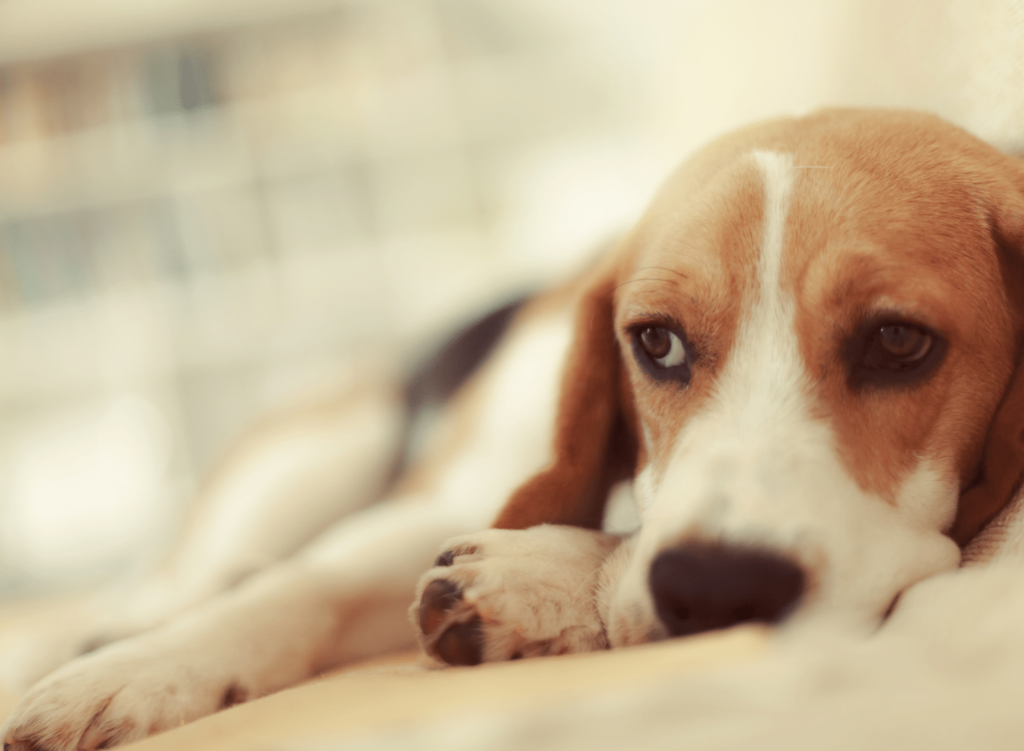
Older dogs facing panting at night may suffer from Cushing’s disease. Cushing’s disease is a disorder in which a dog’s endocrine is affected. In this, too much cortisol is produced by the adrenal glands of dogs.
Cushing’s disease is mostly found in older dogs. If you want to know whether your dog is suffering from this disease, you have to notice the following symptoms in your older dog.
- Abnormal panting
- Hair Loss
- Excessive thirst & hunger
- Urination
- Pot-like belly
When these symptoms occur in your dog, pay extra attention to him. Your dog may also show noise while panting. Try to consult your veterinarian to perform better treatment for your dog.
8. Canine Cognitive Dysfunction
If your dog is showing some behavioral changes, it might be facing CCD or Canine Cognitive Disorder. In this degenerative disease, dogs face dementia-like syndrome in their older age. It is also known as canine anxiety. A dementia dog will show substantial panting.
Symptoms of dog dementia include:
- Panting
- Pacing
- Changes in behavior
- Changes in motor functions
- Disrupted sleep-wake cycle.
This disease can lead your dog from memory loss to deadly factors. When you see your dog illustrating all these symptoms, consult the veterinarian. This disease is proved incurable, but it can be controlled before it becomes deadly.
The treatment of CCD includes various supplements, strategies for behavior modifications, and medication.
9. BOAS
Abnormal panting at night or even daytime, maybe just because of BOAS. The BOAS stands for Brachycephalic Obstructive Airway Syndrome. This disorder is found in breeds with flat faces or short noses like bulls because of genetic disposition. These breeds show substantial panting even while doing nothing. These dogs include
- Pugs
- French Bulldogs
- Shih Tzus
In BOAS, dogs have structural abnormalities, which lead to panting. These dogs will face panting by only doing a little exercise.
When they do more exercise, their body temperature increases. Therefore, they balance their body temperature by panting and pacing.
These breeds face breathing difficulties, especially in hot weather. Its treatment includes using a white nose, surgeries, etc. You should consult a vet; he’ll recommend the best option.
10. Medications
Besides diseases, some medications also cause an overly warm condition which causes unusual panting in your dogs. These medications may upset your dog’s stomach, which produces heat in the body.
A few medications may also react with your dog’s body and lead to allergic reactions. If a medication doesn’t suit your dog, it will show cues like
- Blue gums
- Abnormal behavior
- Intense pacing
- Restlessness
- Losing appetite
- Repetitive yawning
- Allergic reaction
Medications like Prednisone and steroids are famous for causing heavy panting in dogs. If your dog is going through this type of medication and showing more panting than normal. So, inform your veterinarian to control the issue with veterinary drugs.
11. Obesity
Not as a primary reason, but obesity can cause several health issues for which nighttime panting in dogs can be an early symptom. If you find your dog overweight, you need to take care of your dog’s proper exercising schedules and avoid dog food with loaded calories.
Also, beware not to feed your dog from your plates, as it is extra calories. If your dog is obese, you must visit your veteran for further advice.
How can you Treat Substantial Panting in Dogs at Night?
Treatments for abnormal dog panting at night vary from cause to cause. The first step of treatment is the diagnosis of the disease.
Diagnostic Testing
You can find the perfect treatment when you know where the problem is. Finding the exact affected area will save your time, money, and don’t bother your dog more. The veterinarian can diagnose the disease by following tests;
- Physical examination.
- Radiographs of doubted area
- Blood tests
- Urinalysis
And many more tests according to the prescription of your veterinarian. A few basic treatments for unusual dog panting are explained below;
- Offer your dog water.
- Move to a cooler place.
- Prescribed medications.
- Behavior modification exercises
- Use white-nose.
- Anxiety-reducing wraps.
Home remedies are also considered the best treatment for unusual panting. There are no specific home remedies.
But the treatment of your dog’s restlessness or abnormal panting is always better at home. These tactics include;
- Give your dog more time.
- Provide your dog a comfortable place.
- If any noise in your home is annoying your dog, avoid that noise.
- When you notice some serious changes, consult a vet about dogs’ pants.
- If your dogs suffer from overheating, move them to a calmer & cooler place.
FAQ about Why your Dog Pants at Night
Why is my dog panting while resting?
You might always think that is why your dog is panting at night. Many reasons lead your dog to pant while resting—the main reason for dog panting while resting is stress.
When your dog is under stress, it will start panting unusually. The continuous stress to your dog may lead to serious anxiety. The stressed dog should be cured on time before they become fatal.
When should I worry about my dog panting?
Dogs’ panting is perfectly normal behavior as it regulates and balances their body temperature. But sometimes, it becomes fatal. Therefore, monitor every change in your dog’s panting.
When your dog shows serious symptoms like having blue gums, intense coughing, panting while resting, you should be worried about your dog’s health.
When to see a veterinarian for a Dog Panting abnormally?
It would help if you always remembered panting is normal for dogs. It maintains dogs’ body temperature because they lack sweat glands.
If your dog is panting after exercise, you need not worry. Your dog is in a normal situation.
Sometimes, when your dog seems restless or keeps panting heavily while resting, you should contact a vet immediately. There are the following factors that a vet should see.
- Panting becomes continuous and intense.
- When you feel your dog is in pain.
- Coughing.
- Weight changes.
- Excessive drinking.
- Heavy panting while resting.
And many other symptoms which make you doubt that your dog is unwell. You should make an appointment with a vet immediately.
Conclusion
Most dog owners are worried about their dogs panting at night, but they don’t know the reason behind them.
We hope this article has helped you identify the primary cause of your dogs’ restlessness. It’ll also help you in treating your dog’s discomfort in case there is no underlying health condition but the environment’s.
doglover.biz is a participant in the Amazon Associate program and will earn from qualifying purchases.

